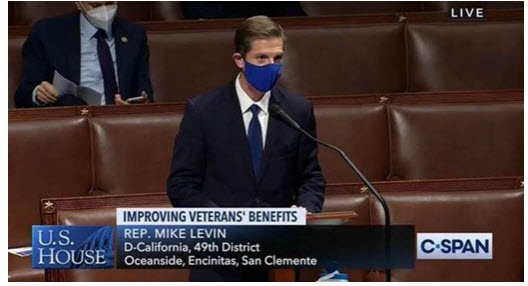Washington, D.C. Legislation introduced by Rep. Mike Levin (D-CA) to strengthen and expand services for veterans passed the House of Representatives and will now go to the President for his signature. The Johnny Isakson and David P. Roe, M.D. Veterans Health Care and Benefits Improvement Act of 2020 (H.R. 7105) includes many provisions Rep. Levin led to allow the Department of Veterans Affairs (VA) to provide more services for homeless veterans, improve the HUD-VA Supportive Housing program, improve the Transition Assistance Program (TAP) for servicemembers returning to civilian life, and much more. It also includes legislation by Rep. Levin’s colleagues to strengthen VA health care services, support women veterans, increase VA oversight, and more. A section-by-section summary of the bill is available here.
“This pandemic has been devastating for all Americans, including those who have served and sacrificed for our country,” said Rep. Levin. “I have seen veterans in my district lining up for food, heard from homeless and housing insecure veterans who couldn’t access desperately-needed resources, and met with veterans who struggled to start new careers despite services that should’ve been there for them. That’s unacceptable, and we must do more to help get them back on their feet. I am proud to lead H.R. 7105 to provide much-needed relief for veterans during this pandemic, and strengthen their benefits in the years beyond. I am deeply grateful for the partnership of Chairman Mark Takano and all of my colleagues who contributed to this legislation.”
Highlights from H.R. 7105:
The Homeless Veteran Coronavirus Response Act, which Rep. Levin introduced with Rep. Gus Bilirakis (R-FL), allows VA to use existing funds for a wider range of services; authorizes the Department to collaborate with outside organizations to facilitate shelters on its properties; loosens restrictions on Grant and Per Diem (GPD) payments; and requires VA to ensure veterans participating in VA homeless programs have access to VA telehealth services.
The Reducing Veteran Homelessness Act, which Rep. Levin introduced with Rep. Kevin McCarthy (R-CA), ensures that homeless veterans and their families receive the resources and services they deserve by filling gaps in HUD-VA Supportive Housing (HUD-VASH) case management, increasing payments to organizations that house homeless veterans, and reimbursing those organizations for fees to access local Homeless Management Information Systems so they can better track outcomes of homeless veterans.
The Housing for Women Veterans Act, which Rep. Levin introduced with Rep. Brian Fitzpatrick (R-PA), requires VA to complete an analysis of its programs that provide assistance to women veterans who are homeless or precariously housed to identify the areas in which such programs are failing to meet their needs, and submit a report to Congress.
The Navy SEAL Chief Petty Officer William “Bill” Mulder (Ret.) Transition Improvement Act of 2019, which Rep. Levin introduced with Rep. Jodey Arrington (R-TX), creates a pilot program for off-base transition training to make the transition process easier for veterans and spouses by giving them more time to access resources and digest the information provided to them, all while living in their new community. The legislation would also create a grant program for organizations to provide multiple transition assistance services such as resume assistance, interview training, and job recruitment training from a central source.
The Pandemic Assistance for Student Veterans Act, which Rep. Levin introduced with Rep. Joe Cunningham (D-SC) and others to minimize the impact and disparities of the COVID-19 pandemic on student veterans.
The Protect the GI Bill Act, which Rep. Levin introduced to increase transparency and accountability among educational programs that receive funding from the VA.
The Brian Tally VA Employment Transparency Act, which Rep. Levin introduced with former Rep. Mark Meadows (R-NC) to support veterans with legal claims against the Department of Veterans Affairs or its contractors.
The Deborah Sampson Act, which addresses inequities and barriers that women veterans face when accessing VA care and benefits.
The Veteran Benefits Enhancement and Expansion Act, including a provision that eliminates the 12-year delimiting date to receive benefits under Veteran Readiness and Employment program for disabled veterans who separated from the military on or after January 1, 2013.
A provision from the Surviving Families Benefit Expansion Act that lowers from 57 to 55 years old the age at which a surviving spouse may still receive dependency and indemnity compensation (DIC) benefits at the point of remarriage.
The Accountability in Department of Veterans Affairs Scheduling and Consult Management Act, which will hold the VA accountable for the amount of time it takes to refer veterans to a community health care provider.
The VET TEC Expansion Act, which would expand a high technology training pilot program to transitioning servicemembers within 180 days of their separation and increase the annual funding for the program from $15 million to $45 million.
Support for H.R. 7105 from Veterans Service Organizations:
“The comprehensive Johnny Isakson and David P. Roe, M.D. Veterans Health Care and Benefits Improvement Act of 2020 includes numerous provisions that The American Legion has long supported,” said American Legion National Commander James W. “Bill” Oxford. “This package improves women’s healthcare at VA, protects the GI Bill, addresses toxic exposure issues ranging from Vietnam to today, and affords veterans much needed protections during the COVID-19 pandemic. This bill represents years’ worth of advocacy and collaboration between the VSO community, Congress, and VA while also paying homage to two men who have done so much on behalf of the veteran community, Senator Isakson and Congressman Roe.”
“This landmark legislation provides dozens of provisions that will help service members, veterans, and their families,” said Pat Murray, Director of VFW’s National Legislative Service. “The VFW strongly supports this package to help improve benefits and care for women veterans, transitioning veterans, veterans seeking employment training, student veterans, surviving families, and much more. The Johnny Isakson and David P. Roe, M.D. Veterans Health Care and Benefits Improvement Act of 2020 is a great example of bipartisan bicameral legislation focused on helping our heroes. The VFW thanks Congressman Mike Levin for hard work in making this happen.”
“The Johnny Isakson and David P. Roe, M.D. Veterans Health Care and Benefits Improvement Act of 2020 addresses many urgent needs faced by the veterans who have served our nation and Wounded Warrior Project fully supports its passage,” said WWP Vice President of Government Affairs Jose Ramos. “We thank the House for their expeditious and bipartisan leadership on this issue and their support of our nation’s veterans.
“The provisions included in H.R. 7105 will positively impact veterans’ education, housing and survivor benefits; strengthen health care and benefits programs for women veterans; and restore the publicly available Disability Benefits Questionnaire,” said Disabled American Veterans (DAV) National Legislative Director Joy J. Ilem. “DAV is pleased to support this legislation, and to see it receive the bipartisan, bicameral support needed for final passage before the end of this Congress. We thank Chairman Moran, Senator Tester, Chairman Takano and Ranking Member Roe for their leadership and hard work over the past two years.”
We applaud the House and Senate for the passage of the Johnny Isakson and David P. Roe, M.D. Veterans Health Care and Benefits Improvement Act and thank Congressman Levin for all of his bipartisan work in order to get this groundbreaking legislation passed into law,” said Jeremy Butler, Iraq and Afghanistan Veterans of America (IAVA) CEO. “Of particular note, this important and expansive new legislation contains the groundbreaking Deborah Sampson Act, a measure IAVA has fought for nearly four years to close many gaps in care for women veterans. This legislation also includes provisions to provide assistance for homeless veterans, protections and increased benefits for military-connected students, and many other aggressive measures.”
“We are grateful to Chairman Levin for his key leadership on this important legislation and for collaborating so effectively, across the aisle, to get this across the finish line,” said Veterans Education Success President Carrie Wofford.
“In recent years, student veterans and their families have called for critical improvements to VA education benefits, and this year, the students using these benefits faced unprecedented challenges due to the pandemic,” said Jared Lyon, National President and CEO, with Student Veterans of America. “The Johnny Isakson and David P. Roe, M.D. Veterans Health Care and Benefits Improvement Act of 2020 is a monumental package of veterans’ legislation that addresses many of these issues—from making fixes to benefits like in-state tuition, the Montgomery GI Bill, and the Yellow Ribbon Program, to expanding protections for students using VA benefits if they are negatively impacted by COVID-19—and SVA applauds the Senate and House Veterans Affairs Committees for the effort that went into this comprehensive bill.”
“This is a critical package of needed improvements for VA’s health care and benefit programs,” said Heather Ansley, Paralyzed Veterans of America Associate Executive Director for Government Relations. “We thank Congress for working diligently to reach this agreement and ensure these much-needed changes will soon become law.”


















